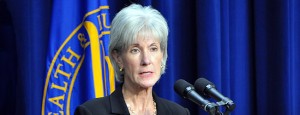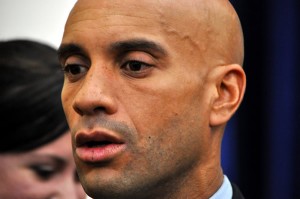Health
D.C. to host 2012 AIDS conference

Secretary of State Hillary Clinton said the 2012 International AIDS Conference will bring together 30,000 scientists, policy makers and activists from around the world. (DC Agenda photo by Michael Key)
Citing a dedication to combat the HIV/AIDS pandemic, top Obama administration officials formally announced Monday that Washington, D.C., will host the 19th International AIDS Conference in 2012.
The announcement came at a White House event at the Eisenhower Executive Office Building as part of the commemoration of World AIDS Day, which is geared toward heightening awareness of the HIV/AIDS epidemic around the globe.
Secretary of State Hillary Clinton said the conference would help foster discussion on combating HIV/AIDS.
“This conference will draw together an estimated 30,000 researchers, scientists, policy makers, health care providers, activists and others from around the world,” she said.
The U.S. is able to host the conference after repealing the administrative ban that prevents HIV-positive foreign nationals from entering the country. The repeal, implemented earlier this year, is expected to go into effect Jan 4.
Kathleen Sebelius, secretary of health and human services, praised the end of the ban during the event and said it will help the U.S. continue its role in the global fight against HIV/AIDS.
“The HIV entry ban was a policy that tore apart families, kept people from getting tested, forced others to hide their HIV status and forgo life-saving medications,” she said. “And most of all, it didn’t reflect America’s leadership in fighting the disease around the world.”
Since many participants for the international AIDS conference are foreign nationals who are HIV positive, the ban had prevented the U.S. from hosting the event. The last U.S. conference took place in 1990 in San Francisco. Another was scheduled in Boston in 1992, but was moved to Amsterdam out of concerns over the U.S. ban.
Elly Katabura, the Uganda-based president-elect of the International AIDS Society and international chair of the conference, said his organization decided to hold the event in the U.S. after the Obama administration lifted the HIV travel ban.

‘The HIV entry ban was a policy that tore apart families, kept people from getting tested, forced others to hide their HIV status and forgo life-saving medications,’ said Kathleen Sebelius, secretary of Health & Human Services. (DC Agenda photo by Michael Key)
“This change is a significant victory for public health and human rights,” he said. “The IAS now calls on all countries that still have similar policies that restrict free movement of people with HIV and AIDS through their borders to remove them immediately.”
The decision to hold the conference in D.C. also is significant because the HIV/AIDS epidemic has hit the city hard. Around 3 percent of D.C. residents are known to have HIV/AIDS.
D.C. Mayor Adrian Fenty, who attended Monday’s event, told DC Agenda that hosting the conference in the District will help raise awareness of “how this disease is affecting inner cities in the United States of America.”
“Hopefully, by having it here, by being the showcase with the biggest problems and what we’re doing to solve them, we’ll also come up with new ideas that will be taken around to places throughout this country and the world following the conference in 2012,” he said.
Sebelius said HIV/AIDS still has an impact on LGBT people throughout the country, particularly those who are black. She said in five major U.S. cities, almost half of all black gay men are HIV positive.
But officials cited the work the administration and Congress have done in confronting the epidemic both at home and abroad, including the reauthorization of funds under the Ryan White Care Act to provide assistance to low-income people with HIV/AIDS and the inclusion of HIV/AIDS provisions in health care reform legislation before Congress.
The development of a national AIDS strategy also is underway. Sebelius noted the administration is holding town hall meetings in cities throughout the country to hear concerns about addressing the epidemic.
Valerie Jarrett, senior adviser and assistant to Obama for intergovernmental affairs and public engagement, said HIV/AIDS is a “personal” issue for the president, particularly with regard to the domestic epidemic.

D.C. Mayor Adrian Fenty, who attended Monday’s event, said hosting the conference in the District will help raise awareness of ‘how this disease is affecting inner cities in the United States of America.’ (DC Agenda photo by Michael Key)
“He has said that we’re not always very good at talking about HIV/AIDS,” she said. “We have to do a better job of talking about it in our places of worship, throughout our communities and our organizations, our schools and, of course, our workplace.”
Reflecting on the symbols of World AIDS Day, including the large AIDS ribbon that adorned the White House in recognition of the occasion, Jarrett said fighting HIV/AIDS is “deep and personal” for her and that her sister-in-law died a “tragic death.”
“I saw the other members of her family and 5-year-old daughter, as well, all struggle with her death,” she said. “I’ve also had close friends who have either passed away as a result of AIDS or who are living with AIDS right now.”
The issue of how discrimination against LGBT people abroad interferes with combating the global HIV/AIDS epidemic also was discussed during the event.
Clinton said the Obama administration would “combat discrimination” around the world, noting that international efforts against HIV/AIDS are “hampered whenever discrimination or marginalization of certain populations results in less effective outreach and treatment.”
“We have to stand against any efforts to marginalize and criminalize and penalize members of the LGBT community worldwide,” she said, drawing applause from the audience. “It is an unacceptable step backwards on behalf of human rights. But it is also a step that undermines the effectiveness of efforts to fight the disease worldwide.”
Additional efforts to confront the global epidemic are expected to emerge soon. Eric Goosby, the U.S. Global AIDS Coordinator, said he planned later this week to unveil the new five-year strategy for the President’s Emergency Plan for AIDS Relief, an effort designed to fight the global AIDS crisis first implemented by former President George W. Bush.
He said the new strategy “will focus on sustainability” as well as programs that are “country-owed and economy-driven” and “address HIV/AIDS in the context of the broader health needs.”
Monkeypox
US contributes more than $90 million to fight mpox outbreak in Africa
WHO and Africa CDC has declared a public health emergency

The U.S. has contributed more than $90 million to the fight against the mpox outbreak in Africa.
The U.S. Agency for International Development on Tuesday in a press release announced “up to an additional” $35 million “in emergency health assistance to bolster response efforts for the clade I mpox outbreak in Central and Eastern Africa, pending congressional notification.” The press release notes the Biden-Harris administration previously pledged more than $55 million to fight the outbreak in Congo and other African countries.
“The additional assistance announced today will enable USAID to continue working closely with affected countries, as well as regional and global health partners, to expand support and reduce the impact of this outbreak as it continues to evolve,” it reads. “USAID support includes assistance with surveillance, diagnostics, risk communication and community engagement, infection prevention and control, case management, and vaccination planning and coordination.”
The World Health Organization and the Africa Centers for Disease Control and Prevention last week declared the outbreak a public health emergency.
The Washington Blade last week reported there are more than 17,000 suspected mpox cases across in Congo, Uganda, Kenya, Rwanda, and other African countries. The outbreak has claimed more than 500 lives, mostly in Congo.
Health
Mpox outbreak in Africa declared global health emergency
ONE: 10 million vaccine doses needed on the continent

Medical facilities that provide treatment to gay and bisexual men in some East African countries are already collaborating with them to prevent the spread of a new wave of mpox cases after the World Health Organization on Wednesday declared a global health emergency.
The collaboration, both in Uganda and Kenya, comes amid WHO’s latest report released on Aug. 12, which reveals that nine out of every 10 reported mpox cases are men with sex as the most common cause of infection.
The global mpox outbreak report — based on data that national authorities collected between January 2022 and June of this year — notes 87,189 of the 90,410 reported cases were men. Ninety-six percent of whom were infected through sex.
Sexual contact as the leading mode of transmission accounted for 19,102 of 22,802 cases, followed by non-sexual person-to-person contact. Genital rash was the most common symptom, followed by fever and systemic rash.
The WHO report states the pattern of mpox virus transmission has persisted over the last six months, with 97 percent of new cases reporting sexual contact through oral, vaginal, or anal sex with infected people.
“Sexual transmission has been recorded in the Democratic Republic of Congo among sex workers and men who have sex with men,” the report reads. “Among cases exposed through sexual contact in the Democratic Republic of the Congo, some individuals present only with genital lesions, rather than the more typical extensive rash associated with the virus.”
The growing mpox cases, which are now more than 2,800 reported cases in at least 13 African countries that include Kenya, Uganda, Rwanda, and prompted the Africa Centers for Disease Control and Prevention this week to declare the disease a public health emergency for resource mobilization on the continent to tackle it.
“Africa has long been on the frontlines in the fight against infectious diseases, often with limited resources,” said Africa CDC Director General Jean Kaseya. “The battle against Mpox demands a global response. We need your support, expertise, and solidarity. The world cannot afford to turn a blind eye to this crisis.”
The disease has so far claimed more than 500 lives, mostly in Congo, even as the Africa CDC notes suspected mpox cases across the continent have surged past 17,000, compared to 7,146 cases in 2022 and 14,957 cases last year.
“This is just the tip of the iceberg when we consider the many weaknesses in surveillance, laboratory testing, and contact tracing,” Kaseya said.
WHO, led by Director General Tedros Adhanom Ghebreyesus, also followed the Africa CDC’s move by declaring the mpox outbreak a public health emergency of international concern.
The latest WHO report reveals that men, including those who identify as gay and bisexual, constitute most mpox cases in Kenya and Uganda. The two countries have recorded their first cases, and has put queer rights organizations and health care centers that treat the LGBTQ community on high alert.
The Uganda Minority Shelters Consortium, for example, confirmed to the Washington Blade that the collaboration with health service providers to prevent the spread of mpox among gay and bisexual men is “nascent and uneven.”
“While some community-led health service providers such as Ark Wellness Clinic, Children of the Sun Clinic, Ice Breakers Uganda Clinic, and Happy Family Youth Clinic, have demonstrated commendable efforts, widespread collaboration on mpox prevention remains a significant gap,” UMSC Coordinator John Grace stated. “This is particularly evident when compared to the response to the previous Red Eyes outbreak within the LGBT community.”
Grace noted that as of Wednesday, there were no known queer-friendly health service providers to offer mpox vaccinations to men who have sex with men. He called for health care centers to provide inclusive services and a more coordinated approach.
Although Grace pointed out the fear of discrimination — and particularly Uganda’s Anti-Homosexuality Act — remains a big barrier to mpox prevention through testing, vaccination, and treatment among queer people, he confirmed no mpox cases have been reported among the LGBTQ community.
Uganda so far has reported two mpox cases — refugees who had travelled from Congo.
“We are for the most part encouraging safer sex practices even after potential future vaccinations are conducted as it can also be spread through bodily fluids like saliva and sweat,” Grace said.
Grace also noted that raising awareness about mpox among the queer community and seeking treatment when infected remains a challenge due to the historical and ongoing homophobic stigma and that more comprehensive and reliable advocacy is needed. He said Grindr and other digital platforms have been crucial in raising awareness.
The declarations of mpox as a global health emergency have already attracted demand for global leaders to support African countries to swiftly obtain the necessary vaccines and diagnostics.
“History shows we must act quickly and decisively when a public health emergency strikes. The current Mpox outbreak in Africa is one such emergency,” said ONE Global Health Senior Policy Director Jenny Ottenhoff.
ONE is a global, nonpartisan organization that advocates for the investments needed to create economic opportunities and healthier lives in Africa.
Ottenhoff warned failure to support the African countries with medical supplies needed to tackle mpox would leave the continent defenseless against the virus.
To ensure that African countries are adequately supported, ONE wants governments and pharmaceutical companies to urgently increase the provision of mpox vaccines so that the most affected African countries have affordable access to them. It also notes 10 million vaccine doses are currently needed to control the mpox outbreak in Africa, yet the continent has only 200,000 doses.
The Blade has reached out to Ishtar MSM, a community-based healthcare center in Nairobi, Kenya, that offers to service to gay and bisexual men, about their response to the mpox outbreak.
Health
White House urged to expand PrEP coverage for injectable form
HIV/AIDS service organizations made call on Wednesday

A coalition of 63 organizations dedicated to ending HIV called on the Biden-Harris administration on Wednesday to require insurers to cover long-acting pre-exposure prophylaxis (PrEP) without cost-sharing.
In a letter to Chiquita Brooks-LaSure, administrator of the Centers for Medicare and Medicaid Services, the groups emphasized the need for broad and equitable access to PrEP free of insurance barriers.
Long-acting PrEP is an injectable form of PrEP that’s effective over a long period of time. The FDA approved Apretude (cabotegravir extended-release injectable suspension) as the first and only long-acting injectable PrEP in late 2021. It’s intended for adults and adolescents weighing at least 77 lbs. who are at risk for HIV through sex.
The U.S. Preventive Services Task Force updated its recommendation for PrEP on Aug. 22, 2023, to include new medications such as the first long-acting PrEP drug. The coalition wants CMS to issue guidance requiring insurers to cover all forms of PrEP, including current and future FDA-approved drugs.
“Long-acting PrEP can be the answer to low PrEP uptake, particularly in communities not using PrEP today,” said Carl Schmid, executive director of the HIV+Hepatitis Policy Institute. “The Biden administration has an opportunity to ensure that people with private insurance can access PrEP now and into the future, free of any cost-sharing, with properly worded guidance to insurers.”
Currently, only 36 percent of those who could benefit from PrEP are using it. Significant disparities exist among racial and ethnic groups. Black people constitute 39 percent of new HIV diagnoses but only 14 percent of PrEP users, while Latinos represent 31 percent of new diagnoses but only 18 percent of PrEP users. In contrast, white people represent 24 percent of HIV diagnoses but 64 percent of PrEP users.
The groups also want CMS to prohibit insurers from employing prior authorization for PrEP, citing it as a significant barrier to access. Several states, including New York and California, already prohibit prior authorization for PrEP.
Modeling conducted for HIV+Hep, based on clinical trials of a once every 2-month injection, suggests that 87 percent more HIV cases would be averted compared to daily oral PrEP, with $4.25 billion in averted healthcare costs over 10 years.
Despite guidance issued to insurers in July 2021, PrEP users continue to report being charged cost-sharing for both the drug and ancillary services. A recent review of claims data found that 36 percent of PrEP users were charged for their drugs, and even 31 percent of those using generic PrEP faced cost-sharing.
The coalition’s letter follows a more detailed communication sent by HIV+Hepatitis Policy Institute to the Biden administration on July 2.
Signatories to the community letter include Advocates for Youth, AIDS United, Equality California, Fenway Health, Human Rights Campaign, and the National Coalition of STD Directors, among others.
-

 District of Columbia5 days ago
District of Columbia5 days agoFinal push to raise funds, fill D.C. hotels as WorldPride nears
-

 El Salvador3 days ago
El Salvador3 days agoGay Venezuelan makeup artist remains in El Salvador mega prison
-

 District of Columbia4 days ago
District of Columbia4 days agoReenactment of 1965 gay rights protest at White House set for April 17
-

 Maryland5 days ago
Maryland5 days agoFreeState Justice: Transgender activist ‘hijacked’ Moore’s Transgender Day of Visibility event











